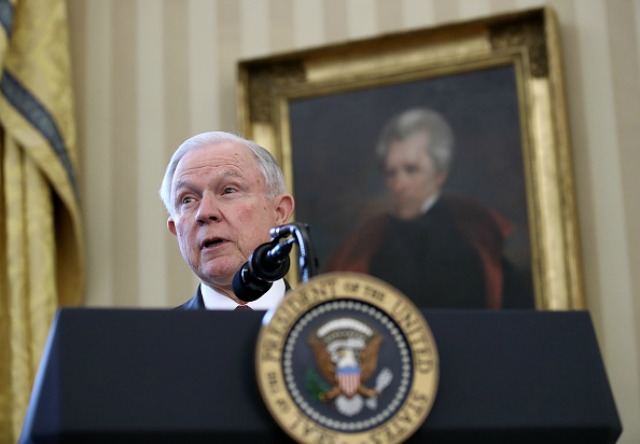Jeff Sessions Is Blaming Chicago's Crime On Its Sanctuary City Policy
By Stephen Gossett in News on Aug 16, 2017 4:23PM

Attorney General Jeff Sessions / Getty Images / Photo: Win McNamee
Update, 3:20 p.m.:
As promised, Attorney General Jeff Sessions dug in further in his war of words against Mayor Rahm Emanuel. "If voters are concerned about losing federal grant money, call your mayor," Sessions said at his Miami speech, according to Politico.
"Rather than acknowledge soaring murder counts or the heartbreaking stories told by victims’ families, Chicago’s mayor has chosen to sue the federal government,” Sessions added, who pushed back on claims that sanctuary policies make cities safer. "For the sake of their city, Chicago’s leaders need to recommit to policies that punish criminals instead of protecting them. They need to protect their citizens and not the criminals."
Mayor Rahm Emanuel meanwhile pushed back against Sessions in a statement on Wednesday, referencing the president's much-derided recent response to white extremism in the process:
"In a week in which the Trump administration is being forced to answer questions about neo-Nazis, white supremacists, and the KKK, they could not have picked a worse time to resume their attack on the immigrants who see America as a beacon of hope. Chicago will continue to stand up proudly as a welcoming city."
Original:
In the wake of Chicago's announced lawsuit against the Department of Justice for its threats to strip funds from sanctuary cities, Attorney General Jeff Sessions is wasting no time in using his platform to blast Chicago's crime rate and link it to the city's sanctuary policies. And it sounds like he'll have more stern works in store for Mayor Rahm Emanuel on Wednesday.
Sessions, who is due to appear on Wednesday in Miami with U.S. Immigration and Customs Enforcement (ICE) Acting Director Tom Homan, said he will "take on Chicago political leadership" when he speaks about sanctuary cities.
The location choice of Miami was made clear in a statement from Sessions that implied Chicago's violent crime is tied to its sanctuary policy. Sessions said:
"I know that Miami-Dade will be an example of the good that comes from following the law. We have already seen that: the same Independence Day weekend when Chicago suffered more than 100 shootings and 15 homicides, Miami-Dade also had a historic number of shooting deaths—zero."
Miami-Dade has "increased their cooperation and information sharing with federal immigration authorities" and "demonstrated a fundamental commitment to the rule of law," the announcement reads. The between-the-lines implication is of course that Chicago has not. As a sanctuary-city department, CPD does not question suspects about immigration status or detain arrestees beyond their release time so that they can be handed over to ICE.
Stil, available evidence does not suggest a link between violent crime and undocumented immigration.
A study published by the Center for American Progress determined that sanctuary cities had better safety and had greater economic conditions than cities without sanctuary policies.
Sessions had previously chided Chicago's "culture of lawlessness" after the DOJ lawsuit was announced. At the same time, several community groups have criticized Rahm's legal challenge as political misdirection that distracts from broader immigration reform in Chicago.
In any event, expect further Chicago-directed, political fireworks from Sessions when he speaks in Miami. We'll update as necessary.